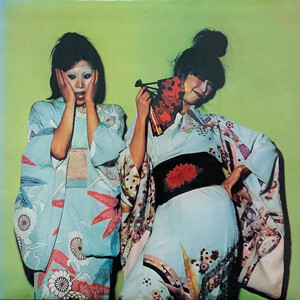

Image via Wikipedia
Who don’t love Sparks? I suppose the folks who don’t know who Sparks are might not love Sparks, but that’s only because of plum ignorance. But REST EASY, reader — we’re here to set you straight by reviewing ALL the Sparks records — and not just by one, but TWO (and maybe occasionally MORE!) Die-Hard Sparks Fan Reviewers. We shall be your guide into the wonderful world of Mael. Check it out!
Rev. Syung Myung Me: I tend to think of this one as the unofficial first Sparks album; Sparks/Halfnelson and A Woofer In Tweeter’s Clothing are good, but they almost seem like demos compared to Kimono My House. Apparently, too, this was Kurt Cobain’s favorite album, or at least one of ‘em. It’s stuff like that that makes me kinda sad he killed himself — I’m basically a Nirvana fan, sure, but more importantly, he seems like he would be REALLY FUN to talk records with.
The songs on this album are just amazing, and “This Town Ain’t Big Enough For Both Of Us”, was not only the huge breakout single, but the perfect start to the album with the fading in intro. Not to mention that it’s a great song — and the follow-up, both in terms of singles and track-order, “Amateur Hour” is equally amazing. First, it’s a great song directed to teenagers, the standard pop music market, about relaxing and not worrying about inexperience in the ways of love; a good message — but secondly, it’s probably the only pop song ever to mention Yehudi Menuhin.
Ron’s lyrics are on full-bore here, too. Every song is a clever classic. “Here In Heaven” is about a couple at lover’s leap where one had second thoughts… but not the other. “Hasta Mañana, Monsieur”, which gives the album its title is full of multi-lingual puns based on the danger of a bi-lingual relationship where neither knows the other’s language.
The music is also amazing, too — more fleshed out than the two earlier Bearsville albums — all the songs are catchy and hooky, particularly “Complaints” and “Thank God It’s Not Christmas” (speaking of which, I always found it amusing that a decade later, Queen, themselves charged with being a Sparks ripoff act – not all together fairly, did a song called “Thank God It’s Christmas”; kind of an illustration as to why Queen seemed to do better in the marketplace. A much safer sentiment.). In fact, none of the songs is a miss — the closest I can find is “Equator”, but that’s only because that song took a while to grow on me. It’s still not my favorite, but the “Equat-aaaah, Equat-aaaaah, Equat-aaaah” hook sticks in the ear somethin’ fierce.
The bonus tracks on the CD editions — “Barbecutie” (the flip to “This Town”) and “Lost And Found” (“Amateur Hour”’s reverse) are likewise great — both these B-sides could have fit in on the album perfectly — and even now it’s hard to think of Kimono without them. (The “21st Century Edition” CD by Island also adds a ‘75 live version of “Amateur Hour”, which is likewise pretty cool — but doesn’t include the Kimono band line up, so that’s a little weird.)
Kimono My House is an absolute classic… but the crazy thing is? IT’S NOT EVEN THE BEST SPARKS ALBUM. Amazing.
Aila: Kimono My House is in many ways a natural progression from the previous Sparks album, A Woofer In Tweeter’s Clothing, although it is clearly superior to both of the first two Sparks records. This was also the starting point of Sparks’ years in England, where they would enjoy their first, largest, and most enduring success. This album and its lead single are probably still what the band are most known for, in terms of their worldwide audience.
The album begins with their biggest hit, “This Town Ain’t Big Enough For Both Of Us,” and right off the bat it’s clear to see that something is different about the band. Other than the geographical shift and a lineup change (which hardly accounts for the improvement seeing as the core of the band was still, and would always be, the Mael brothers), the most obvious difference is simply the quality of the songs. Stylistically they aren’t much different from the previous work, but the weakest songs on this record (arguably “Complaints” or “In My Family”) would stand out on either of the first two albums. Production also seems improved, as this albums sounds a bit richer than anything that came before.
“This Town,” deservedly considered Sparks’ signature tune for it’s intricate musical peaks and valleys accompanied by Russell’s operatic singing voice, is only a small part of this record’s success, as nearly every track is a classic. The second track, “Amateur Hour,” is another highly memorable song, this time apparently about adolescent sexual fumblings – and it’s followed by a succession of other great ones including “Falling In Love With Myself Again” and “Thank God It’s Not Christmas.” “Talent Is An Asset” is one of the album’s best tracks, and previews a bit of the sound that was to come for Sparks in the next couple years (I’m thinking particularly of Indiscreet). The album does taper off a bit towards the end, but the final song (on the standard edition at least), “Equator,” is one of my personal favorites of 70s Sparks music. It’s slower and a bit quieter than the rest of the album, but it’s unlike anything Sparks had done to this point and it’s infectious hook makes for a fitting end to a great album.
Overall, I don’t consider this the very best Sparks album, but it is clearly one of the best, and really the first must-have Sparks album. Though their style would change multiple times in the coming decades, Kimono My House is the definitive demonstration of the type of music Sparks made in the first part of the 70s.
